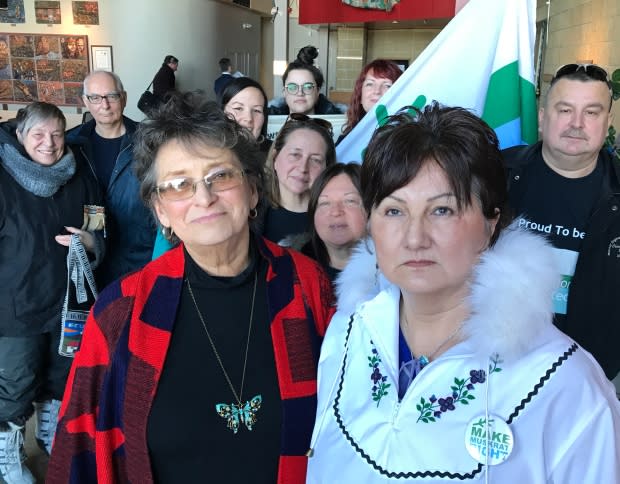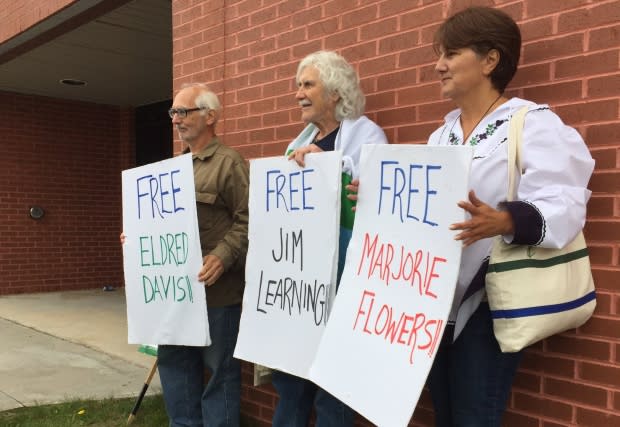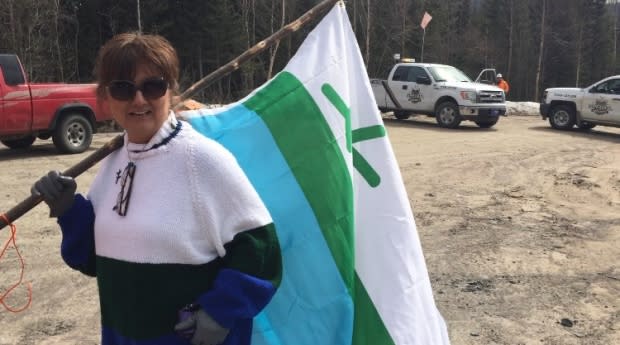Muskrat testimony shifts from budget woes to environmental concerns
After four days focused on the cost and schedule problems facing Muskrat Falls, testimony turned to the environment Friday as a public inquiry into the controversial hydroelectric project concluded the first week of Phase II public hearings in Happy Valley-Goose Bay.
And as expected, Nalcor and the provincial government took a bruising from witnesses Roberta Benefiel and Marjorie Flowers, who have helped lead a vocal lobby against the potential environmental consequences of another hydro generating station on the Churchill River.
Both are members of the Grand River Keeper and Labrador Land Protectors groups, and each gave a detailed history of the protest movement that resulted in significant interruptions at the construction site and a legal battle that continues to wind its way through the court system.

Benefiel and Flowers made it clear their concerns have not been addressed, especially as it relates to the threat of methylmercury contamination downstream of Muskrat and concerns about the North Spur and whether it's stable enough to withstand the massive amounts of water it will be containing once the reservoir is flooded.
Flowers said she has listened to this week's alarming testimony about budget overruns, but told inquiry commissioner Richard LeBlanc that Nalcor's financial woes are the least of her concerns.
As an Indigenous woman, as a person who occupied this land, whose ancestors occupied this land for centuries, we're the ones who will face annihilation as far as I'm concerned. - Marjorie Flowers
"More fundamentally to me as a human being, as an Indigenous woman, as a person who occupied this land, whose ancestors occupied this land for centuries, we're the ones who will face annihilation as far as I'm concerned," said said.
Her comment drew applause from about a dozen supporters who gathered inside the arts centre on Friday.
History of contamination concerns
Fears about increased levels of methylmercury finding its way into the food chain after upstream flooding occurs are an ongoing sore point for many critics of the project.
Those fears were one of the drivers that prompted heated protests at the construction site in late 2016, which climaxed with a temporary suspension of work and numerous arrests. The situation became calmer after the provincial government promised to take action.
An independent expert advisory council was later established with wide-ranging participation from Indigenous groups, the scientific community and others. A series of recommendations was announced in the spring of 2018, including the removal of soil and the capping of wetlands in the reservoir.
But the provincial government has not yet confirmed whether it will accept that recommendation, since experts are divided on whether it's necessary. Such a measure will also adds cost to a project that is already billions over budget.

Meanwhile, Benefiel and Flowers say their patience is wearing thin.
"Nothing has come out of it. There's nothing that gave us any comfort with regards to methylmercury," said Flowers, who made national headlines in the summer of 2017 when she spent 10 days in custody at Her Majesty's Penitentiary because she refused to abide by a court injunction.
"The trust that has been completely eroded over all these years," added Benefiel.
Following their testimony, both women criticized the government for taking so long to act on the recommendations of the advisory committee.
"We've been ignored and lied to so long that my faith is gone completely that the government, at this point, is going to step up to the plate to offer us some reassurance," said Flowers.
I've come this far. Participated as far as going to jail. I can't see myself stopping now. We might as well see this right through the better end. - Marjorie Flowers
Benefiel suggested government is stalling because the project is nearly complete, and it fears further disruptions to the project.
"They don't know what to do about spending more money to take out that soil," Benefiel said.
And if government refuses to to clear out the reservoir? Benefiel offered this threat.

"There will be more protest and there will be more activity if that happens," she said.
Flowers agreed, adding: "I've come this far. Participated as far as going to jail. I can't see myself stopping now. We might as well see this right through the bitter end."
Read more articles from CBC Newfoundland and Labrador

